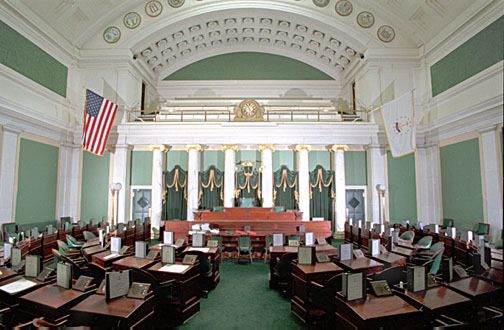 In 2002, the General Assembly was re-shaped as a result of constitutional amendments approved by voters in 1994. Ostensibly the amendments were passed to increase competition for seats in both chambers; yet over the past six general elections 32.02% of Senate seats have gone uncontested on average, along with 37.33% of seats in the House.
In 2002, the General Assembly was re-shaped as a result of constitutional amendments approved by voters in 1994. Ostensibly the amendments were passed to increase competition for seats in both chambers; yet over the past six general elections 32.02% of Senate seats have gone uncontested on average, along with 37.33% of seats in the House.
While common wisdom might be that this type of apathy has benefited Democrats, that’s only half true. In the House of Representatives, both parties have benefited proportionally from this apathy; an average of 37.34% of House Democrats have not faced a general election challenger since 2002. House Republicans have an average of 36.04% over the same period. The difference is negligible.
The Senate is where there is disproportion. Since 2002, an average of 35.74% of Senate Democrats have had uncontested general elections. Senate Republicans have only averaged 18.06%. Why this might be is unclear to me; with a larger district, Senate candidates should require more resources to reach their constituents, meaning House races should be cheaper and thus more accessible.
Alternatively, the large Senate districts mean a larger pool of potential candidates, and the prospect of well-gerrymandered districts combined with a Democratic advantage in voter registration could assist Democrats in generating opponents for Republican candidates while keeping Republicans from contesting Senate elections.
The data gets more revealing of our current state of affairs when one calculates statewide votes cast for each party in each chamber of the General Assembly.
Democratic control over the General Assembly chambers has been extremely disproportional to the actual votes they’ve received. While Democrats typically win about 65% of the vote across Rhode Island when the results of all districts are added together, their control of the chambers is about 20 points higher, hovering around 85% of all the seats in each chamber.
At the same time, Rhode Island has seen a number of third parties compete for seats in the General Assembly; the Greens, the Socialists, the Libertarians, and the Moderates. Only the Moderates have captured above a percentage point of the statewide vote when calculated across all districts.
One final trend has emerged over the past six elections since the General Assembly was reduced. There’s been a growth in votes cast for independents since 2008, with all independent candidates capturing above 4.5% of the vote each of the last three elections. In the three elections prior, independents never managed to eke out above 3.7% of the vote, and were often well under 1%.
It’s possible that there’s a growing discontent with the Democratic Party, which combined with a dislike of the Republican Party, is boosting independents. It’s also possible that as the Millennial Generation began voting in the late 2000s, it’s turned more towards independents than its predecessors. Remember, Millennials were becoming aware of politics in the era between the Clinton Impeachment and the Iraq War; both of which were extreme blows to the credibility of the political establishment. Alternatively, I could be dead wrong.
You can take a look at the spreadsheets I created for yourself:
Post continues on next page (or click below)

